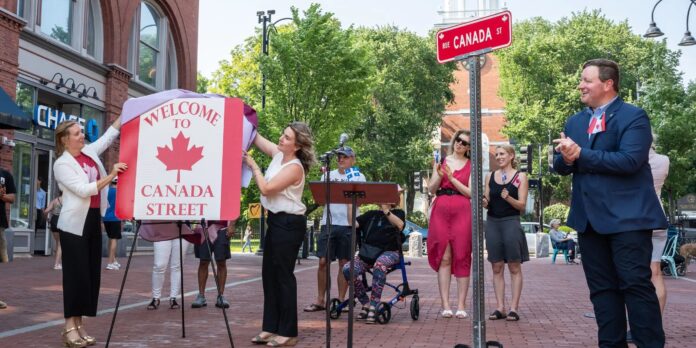The Changing Face of Cross-Border Travel: Where Have All the Canadians Gone?
This summer, the picturesque mountain bike trails of Stowe, Vermont, usually bustling with Quebecois visitors, have felt remarkably quieter. David Rye, the outdoor center director at the famous von Trapp Family Lodge, notes a distinct reduction in French accents and Quebec license plates, highlighting a troubling trend for local businesses that historically thrived on Canadian tourism.
A Notable Decrease in Canadian Visitors
Rye’s observations are part of a larger narrative affecting border states, particularly Vermont. Data indicates a staggering 39% drop in Vermont to Canada border crossings in July compared to the previous year. An unexpected decline in Canadian spending is also noted, with Statistics Canada reporting a 7.9% plunge in the first quarter of 2025 from the year before. Simultaneously, American visits to Canada have increased, with Americans spending 27.3% more during the same period.
Local Businesses Feel the Impact
Nicolo Mendolia, a Trader Joe’s worker in Burlington, Vermont, has noticed emptier shelves during what should be peak busy times. “A big part of that would be that there’s nobody from Quebec coming down,” he lamented, underscoring the socio-economic ramifications of the drop in Canadian visitors. The absence of these tourists has led to quieter streets and dining experiences, marking a significant shift in the local culture and economy.
Tensions at the Border
The cooling relationship between the US and Canada can be traced back to contentious political dynamics. President Trump’s unpredictable stance on trade and Cross-border relations—rhetoric surrounding tariffs and even the flippant suggestion of making Canada the "51st state"—have soured sentiments. This political climate has led some Canadians to reconsider their travel plans to the US. As they share stories of friendship and community, many express feelings of betrayal, akin to "tensions between neighbors" when trust is challenged.
The Emotional Toll on Communities
For many in border towns, the absence of Canadian visitors is more than just an economic concern; it’s a missing piece of the community fabric. Becca Brown McKnight, a city councilor in Burlington, articulates the fear that prolonged decline in Canadian tourism could lead to lasting economic damage, jeopardizing local small businesses that rely on friendly connections across the border. The warmth of past interactions is palpable; McKnight recalls stories of shared experiences that have built lasting memories between Canadians and Vermonters.
Local Campaigns to Rekindle Relationships
In an effort to rekindle cross-border camaraderie, cities like Rochester, New York, have launched heartfelt campaigns aimed at welcoming back Canadian tourists. Their "Dear Canada" initiative reflects a deep appreciation for the cultural and economic bonds that have typically existed. The campaign’s message resonates with a yearning for the past: "We’ve missed you. Your sense of adventure. The way you savor every bite." Such efforts show a commitment to rebuilding bridges, even amidst challenging political waters.
Creative Gestures to Showcase Friendship
Burlington city council has even gone so far as to temporarily rename its main shopping street "Rue Canada," a symbolic gesture intended to communicate ongoing friendliness towards Canadian visitors. This action has recently been met with an outpouring of goodwill from Canadians, including letters and flowers echoing a shared history that transcends politics. The emotional connections that bind these neighboring cultures are proving resilient, but it remains a pressing challenge.
A Shift in Travel Intentions
Matthew Hall, an eco-business owner from British Columbia, exemplifies how political tensions have altered travel plans. Hall used to frequent Washington State but has now chosen to remain within Canada, canceling trips to avoid uncertainty. His story mirrors a growing sentiment among Canadians who wish to avoid spending money in the US until they perceive a return to “stability and sanity.”
The Loss of Friendships Across Borders
The decline in cross-border travel isn’t merely economic. For many individuals like Dompe, a longtime traveler to the US from Edmonton, it signifies a loss of personal relationships forged through travel. He reminisces about the friendships made on biking trips and family vacations, feelings of betrayal fueled by current political rhetoric, hinting at a future where making new friends across the border seems increasingly unlikely.
An Uncertain Future
The overarching sentiment from both sides of the border reflects a deep yearning for the days of carefree travel and friendship, as well as a growing concern about what the future holds. Regardless of the political landscape, the desire for human connection remains powerful, yet the landscape of cross-border travel may never be quite the same again. For now, communities are left holding onto their historical ties while navigating the complexities of a changing relationship.
